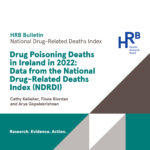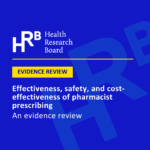Female health conditions under-represented in studies, HRB review finds
Gaps in understanding of female health across OECD
3 min read - 30 Sep 2025

There are substantial gaps in understanding of conditions affecting women including early pregnancy loss and mental health after childbirth, a new Health Research Board (HRB) report has found.
Women’s Health Treatment Interventions and Outcomes: An Evidence and Gap Map Review, found there were no intervention studies conducted in Ireland relating to these conditions along with vaginosis and prolapse.
The review, requested by the Department of Health as part of the Women’s Health Action Plan 2024-2025, examined 2,279 English-language studies published between January 2019 and February 2024 in 38 OECD countries, including Ireland.
It examined ten categories of conditions that exclusively or mainly affect women:
- abnormal menses/symptoms
- cancers of the female reproductive tract
- gynaecological-related conditions/pain
- menopausal symptoms
- pelvic floor disorders
- pelvic organ prolapse
- pelvic and vulvar vaginosis
- female infertility
- early pregnancy loss (<20 weeks)
- postpartum mental health
These were selected based on research with women in Ireland that identified these conditions as important and based on a framework of chronic conditions in women developed by the USA’s National Institutes of Health.
Apart from cancers of the female reproductive tract, four intervention studies or less have been conducted in Ireland on each of the remaining health conditions reviewed.
The four health conditions for which there are no intervention studies conducted in Ireland, are also the least studied across Organisation for Economic Co-operation and Development (OECD) countries.
Under-representation
The review noted this reflects under-representation of female-specific conditions in clinical research, despite women experiencing more ill-health and poorer outcomes than males.
Lead author of the report, Dr Jane Murphy said: “These findings underscore the clear need to strengthen the evidence base for conditions that have a profound impact on women’s lives but remain under-researched. Without comprehensive evidence, we cannot provide optimal care and support to women on a national and international level.”
Of the 10 health condition categories, the five health condition categories with the highest number of studies across OECD countries between January 2019 and February 2024 were: gynaecological-related conditions/pain; cancers of the female reproductive tract; female infertility; pelvic floor disorders; and menopausal symptoms.
Key outcomes
The HRB review also found that while most condition-specific core outcomes were reported in the identified studies, several outcomes were missing including menstrual regularity in adenomyosis, mortality in ectopic pregnancy and miscarriage, suicidal thoughts, attempted suicide and thoughts of harming the baby in postpartum depression.
“Future research must not only address these gaps but also ensure that core outcomes are consistently measured and reported. This is essential to inform clinical decision-making and healthcare policy.
“Engaging multidisciplinary experts and women representatives may be beneficial to interpret the gaps and guide research priorities,” Dr Murphy added.
__
View the report with links to interactive gap maps here.
Dr Murphy will be among the guests discussing the findings of the report on the HRB’s The Health Research Podcast which airs on Monday October 6.
Available on hrb.ie/evidenceforpolicy, Youtube and all major podcast platforms.
3 min read - 30 Sep 2025



